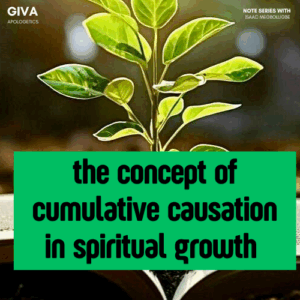
The Concept of Cumulative Causation in Spiritual Growth
Isaac Megbolugbe
July 9, 2025
Introduction
Cumulative causation theory can be applied to spiritual growth, particularly in understanding the love between the Father and the Son. According to John 17:26, Jesus prays that the love with which the Father has loved him may be in believers. This love can be seen as a self-reinforcing process that can intensify and grow over time.
The Love of God: A Self-Reinforcing Process
The love between the Father and the Son is a dynamic and self-sustaining process. As believers, we can experience this love and participate in it. Jesus’ prayer in John 17:26 suggests that the love between the Father and the Son can migrate to us, and we can enjoy this love with unbounded and increasing energy and passion forever [1].
Overcoming Limitations in Our Experience of God’s Love
In our current experience, three things stand in the way of our complete satisfaction: limited worth, limited strength to savor, and limited duration. However, if Jesus’ prayer is answered, these limitations will be overcome. We will experience God’s love with inexhaustible worth, unbounded energy, and eternal duration [2].
Key Takeaways
– God’s love is a self-reinforcing process: The love between the Father and the Son can intensify and grow over time, and believers can participate in this love.
– Inexhaustible worth: The object of our love, Jesus Christ, is infinitely worthy of love and will never become boring or disappointing.
– Unbounded energy: Our ability to savor God’s love will not be limited by human weaknesses, and we will enjoy the Son of God with the very enjoyment of the Father.
Conclusion
The concept of cumulative causation can help us understand the dynamics of God’s love and how it can grow and intensify over time. As believers, we can experience this love and participate in it, and Jesus’ prayer in John 17:26 provides a promise of eternal and unbounded joy in God’s love.
💯💯💯💯💯💯💯💯💯💯